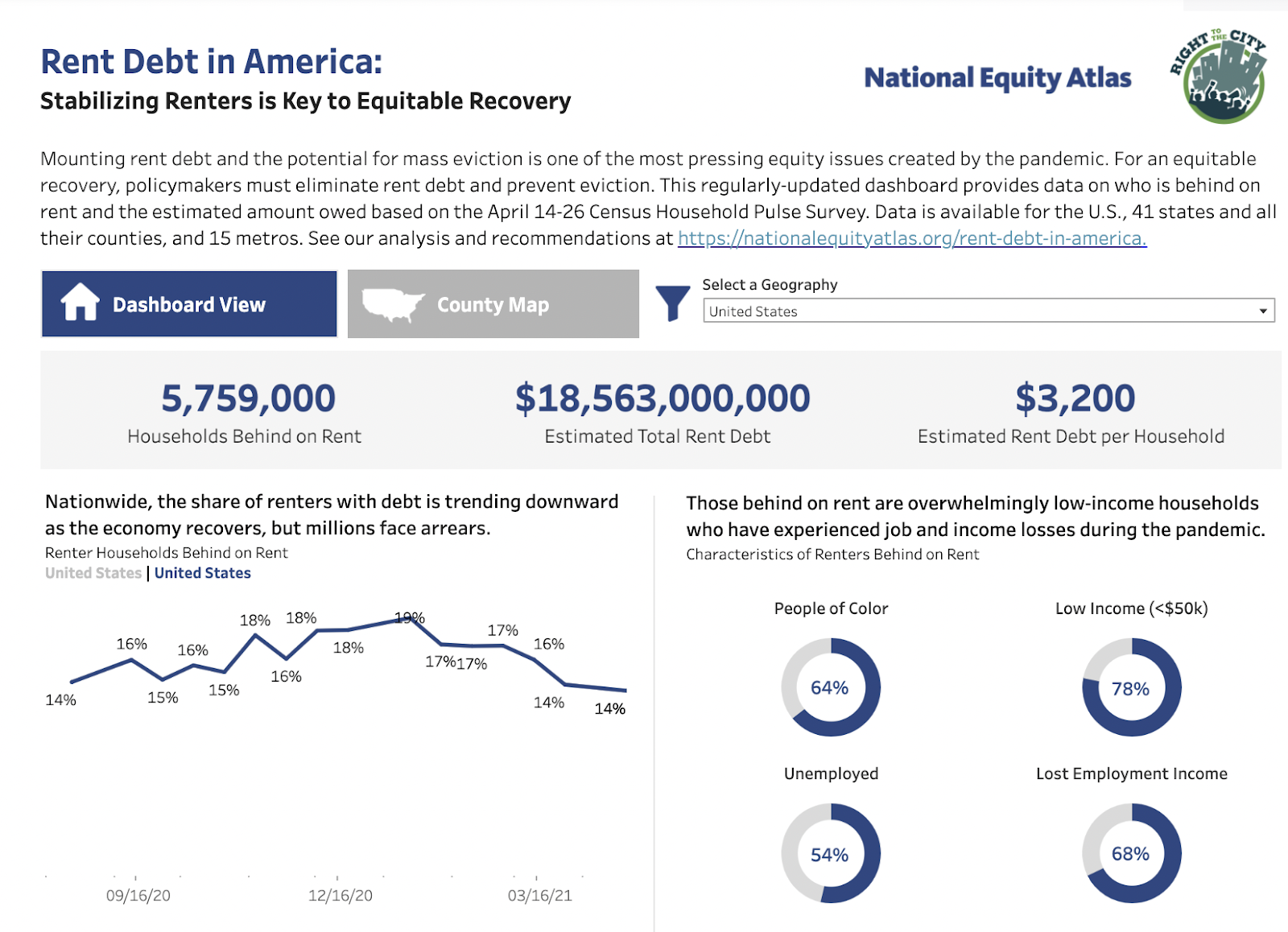Dear Atlas users,
We’ve had an exciting month, from launching the Racial Equity Data Lab to equipping housing advocates across the country with new data on the Covid-driven rent debt crisis. As summer kicks off, we remain focused on producing research and data tools to advance an equitable recovery and shared prosperity. Here are some updates:
Clearing $19 Billion in Back Rent Urgently Needed for Equitable Recovery
This week, we released new national and local data on our Rent Debt Dashboard, produced in partnership with with Right to the City Alliance. As of the end of April, 5.8 million renters — overwhelmingly low-income households of color who’ve lost employment income during the pandemic — owe nearly $19 billion in back rent. With the federal eviction moratorium scheduled to expire at the end of June, clearing this debt is urgently needed to prevent an eviction crisis and make equitable recovery possible. In California, our data was included in a report from Housing NOW, BARHII, and PolicyLink about how the state can strengthen its rental assistance programs. See the data for your community on the dashboard and check out our updated analysis.

Rent Debt Data Supports “Cancel the Rent” Campaign in Oregon
In partnership with Oregon’s Community Alliance of Tenants, the Atlas team released a new fact sheet on rent debt and households behind on rent in Oregon. Even as economic recovery is picking up, in Oregon one in 10 renter households, many of whom are people of color and have low incomes, still owe a total of $170 million in back rent. These renters were the hardest hit by pandemic shutdowns and layoffs, underscoring the continued need for renter protections and rent cancellation as part of an equitable recovery. The new data were presented at the Oregon Cancel the Rent Digital Town Hall alongside stories and learnings from tenant leaders. You can find a recording of the town hall here.
Getting Started in the Racial Equity Data Lab: Create Your Own $15/Hour Fact Sheet
Last month, we launched the Racial Equity Data Lab, a new space on the Atlas where you can create unique data displays, dashboards, and maps. The Lab has everything you need to tell your community’s equity story using Atlas data: ready-to-use datasets, data visualization basics, and a step-by-step guide to get you started. You can watch the recording from our introductory webinar here.
Join us this Thursday, June 3, at 12 pm PT for the second installment of our three-part webinar series, “Getting Started in the Racial Equity Data Lab: Create Your Own $15/Hour Fact Sheet.” Through this series, the Atlas team and our partners at Tableau and Lovelytics will walk you through each step of creating your own $15/hour fact sheet, from accessing the data to publishing a custom visualization that you can download, share, and use to advance equitable recovery strategies in your community. If you missed Part 1: Exploring Your Data, you can watch the recording or follow the instructions in the step-by-step guide on the Lab to update the data for your fact sheet. Click here to register for Part 2: Designing Your Data Viz.
Atlas Team Presents to House Committee on Ways and Means
On May 21, the Atlas team shared the National Equity Atlas with the Ways and Means Committee, the chief tax-writing committee of the US House of Representatives on a panel titled, “Measuring What we Value: Bridging Gaps in Data and Reporting on Race and Ethnicity”that included experts in disaggregated data Randall Akee, Nancy Lopez Ninez Ponce, and Rhonda Sharpe. The Committee recently created a Racial Equity Initiative to address the role of racism in perpetuating health and economic inequities. The Atlas team shared our work to highlight the power of disaggregated data to advance equitable, targeted solutions.
You’re Invited: Join the Measurable Equity One Year Challenge
Join Clear Impact and the National Equity Atlas team for a webinar on June 15 (11 am PT / 2 pm ET) to learn more about the Measurable Equity One Year Challenge. Clear Impact designed this challenge to help government, non-profit, and foundation leaders assess, plan, and advance racial equity using a suite of free resources and tools, including a Racial Equity Scorecard powered by Atlas data. Register here.
In the News
This month, U.S. News, The Intercept, Duluth News Tribune, Governing, The Daily Californian, MPR News, Berkeley News, Minn Post, and AL.com all cited findings from our Rent Debt Dashboard, on both the national and local level. StreetsBlog cited our commute time indicator, which reveals that Black workers have 12 percent longer commute times than their White counterparts. Finally, Reuters covered the launch of our Racial Equity Data Lab.
- The National Equity Atlas team at PolicyLink and the USC Equity Research Institute (ERI)